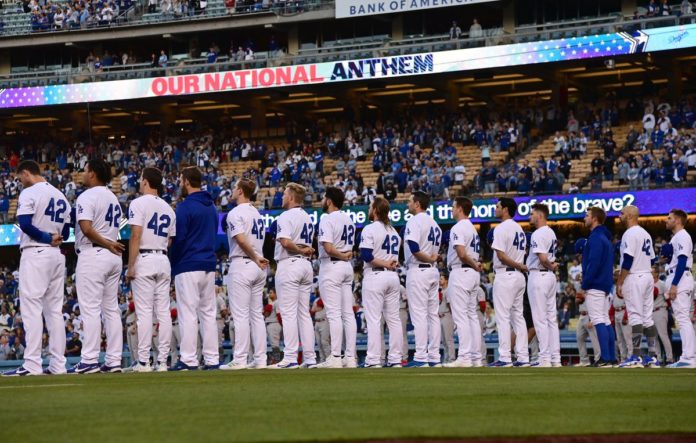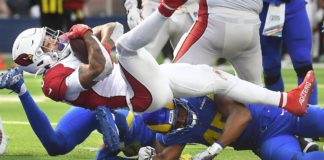Disclaimer: This article discusses issues of race-based violence and contains historical usage of derogatory language directed at homosexuals. The views expressed herein are my own and are not the official stance of TrueBlueLA, SB Nation, or Vox Media. Reader discretion is advised.
Originally, this essay was to come out the morning before Pride Night on June 3, 2022. I delayed it to observe what the Dodgers would do to honor Burke on Pride Night.
Hypotheticals as an Introduction
It is a point of pride that Jackie Robinson broke the color barrier as a Brooklyn Dodger on April 15, 1947. As a result of his talent, his poise, and his grace, Mr. Robinson opened the door for countless other minority ballplayers to find success in the Major Leagues. Major League Baseball even declared that every April 15 is now Jackie Robinson Day with Robinson’s number 42 being retired across the League.
:no_upscale()/cdn.vox-cdn.com/uploads/chorus_asset/file/23605360/usa_today_18096797.jpg)
However, here are two hypotheticals that are likely going to make you feel bad:
What if Jackie Robinson did not debut for the Dodgers on April 15, 1947?
- In this first hypothetical, instead, a rift in time opened and plopped Mr. Robinson back to April 15, 1927 for his Major League debut?
(For the sake of these hypotheticals, Mr. Robinson still plays for the Dodgers, which would be the Robins in 1927 and the Superbas in 1907.)
Well in that first scenario, Mr. Robinson would be playing against the likes of Babe Ruth…and the racist vitriol that Mr. Robinson would likely endure in 1927 would likely be exponentially worse than what he went through in 1947, which was pretty bad.
Hearing racist taunts from fans and players prior to a game, Dodgers teammate Pee Wee Reese is said to have put his arm around Robinson on the field to indicate that he was accepted by those wearing a Brooklyn uniform. Still, Robinson endured racist obscenities, hate mail and death threats for much of his career.
- In this second hypothetical, instead, a different rift in time opened and plopped Mr. Robinson back to April 15, 1907 for his Major League debut?
And in that second scenario, Mr. Robinson would be playing against the likes of noted racist Ty Cobb…and the racist vitriol that Mr. Robinson would likely endure in 1907 would be exponentially worse than what he would experience in 1927.
Frankly, the lynching of Mr. Robinson would not be an unlikely outcome in either scenario.
Looking at these hypotheticals from contemporary eyes, any harm to Mr. Robinson would simply be monstrous. Of course, people of color should be playing in the Major Leagues. Anyone who said otherwise who rightfully be shunned as an outright crank. So why propose this train of thought? Well, for starters, it likely got you to click on the article. (Yes, yes, let’s move on.) Secondly, this hypothetical arguably did occur, sans the lynching. But it was not Jackie Robinson who debuted too soon; it was Glenn Burke, the first openly gay player in the Major Leagues.
But why are you writing about this story? #NoPolitics
I can hear the retorts from here. You use sport to escape the struggle of the world, and so on. Generally, I understand this view, while acknowledging the privilege that it entails. This time though: tough.
There are times when ignoring an injustice is a choice to be complicit and silently accept and perpetuate said injustice. Depriving someone of the opportunity to make their livelihood, at something they are good at, over factors that have absolutely nothing to do with their performance is an injustice. Step back for a moment and apply that standard to Mr. Robinson’s career and the premise sounds ridiculous. Of course, people of color should participate in professional baseball. Think back to what Mr. Robinson went through as he was living his best life, and not doing anything to bother anyone as he broke baseball’s color barrier, and he had to endure the viler nature of this country’s ongoing issues with racism at the risk of his health, his family, and his life. Mr. Robinson’s mere presence on the baseball field was enough to offend the sensibilities who believed that one’s color was a determinative factor in being able to play professional baseball.
If we can all agree that what Mr. Robinson had to endure was wrong, and morally repugnant, then we can apply this same intellectual framework to Mr. Burke. As such, we can and should acknowledge that an injustice was done as the times and the team were not prepared to accept Mr. Burke. There is a legitimate argument that the times and the team are still not prepared to accept someone like Mr. Burke today. But at the end of the day, merely existing as who you are is not shoving your lifestyle down someone’s throat.
This essay is not written as a rebuke to the Dodgers, except where appropriate, or of you personally, my dear reader. For far too long, Mr. Burke’s story pops up for a moment before he is quickly forgotten again. No more.
However, times change and we must change with them because we are different people all throughout our lives. And that’s okay – you have to keep moving, just as long as you remember the people that you used to be. And if you were ignorant regarding this issue as I was, let me help you show you so that we may grow together.
Who is Glenn Burke?
Imagine if folks did not know who you were talking about if you were talking about Jackie Robinson. That mere thought just does not compute. Of course, everyone who knows baseball knows who Jackie Robinson is.
However, human beings are typically terrible at shifting their belief system to accommodate something that does not fit. As an example, I had a very unique law school career working overseas on a genocide case and doing human rights work. It’s hard to market that in a framework as a marketing point to entice other studies to come to the law school, especially when the school is famous for producing trial attorneys.
Without further ado, the following video from Keith Olbermann, who actually covered Glenn Burke in Oakland as a young photographer, will succinctly answer the question of who is Glenn Burke.
[embedded content]
Glenn Burke was a Dodgers prospect who debuted in 1976 and played for the Dodgers until 1978 when he was traded to the Oakland Athletics. Burke was a rising star in the Dodger system, being favorably compared to Willie Mays of all people by various people in the Dodgers organization.
New York Times, Scott Miller, June 2, 2022:
“He could jump out of a stadium,” said Rick Monday, Burke’s former Dodgers teammate and now the club’s radio analyst. “With his vertical leap, he could have been one of Santa’s reindeer.”
Deadspin (republishing an Inside Sports article of October 1982), Michael J. Smith, May 8, 2013:
“[Glenn Burke had] Unlimited potential,” said second baseman Davey Lopes.”
Ironically enough, if Glenn Burke is remembered at all at this point, it is for the fact that he invented the high-five, which debuted the night that Dusty Baker, joined the quartet of Dodger infielders with 30 home runs at the regular-season finale against the Astros in 1977.
:no_upscale()/cdn.vox-cdn.com/uploads/chorus_asset/file/23606363/baker_burke.png)
The high-five, which is practiced globally to this day, was originally our fanbase’s invention, which is a bizarre, and fun statement. However, the gesture is not why were are here today.
:no_upscale()/cdn.vox-cdn.com/uploads/chorus_asset/file/23608070/58f903bd7522ca87088b4e59.jpg)
What happened to Glenn Burke?
If you are my age, about 40, when presented with all of this information, a single, solitary question jumps to mind: How on earth have I not heard of Glenn Burke?!? Did he flame out like Yasiel Puig? Could he not overcome his own demons like Steve Howe? Was he traded in a misguided trade like Pedro Martinez?
As stated earlier, the team and the times failed Glenn Burke. Glenn Burke was openly gay and when the general fandom and the Dodger organization found out in the late 1970s, he was shipped up north, and essentially run out of town.
To add insult to injury, per Burke, before the start of the 1978 season, Al Campanis, the team’s then-general manager, called Burke into his office and offered him a $75,000 bonus to get married. “I guess you mean to a woman,” Burke responded, refusing the offer.
When current Dodgers’ president Stan Kasten was asked about the infamous offer, he had the following to say: “If there’s any truth to the story, I can’t tell you how many different ways that’s wrong.” The evidence for this offer is out there if Mr. Kasten is willing to look. After Mr. Burke refused the offer/had the above conversation with Mr. Campanis, Burke was traded. On May 16, 1978, with Glenn Burke in centerfield as the last out was recorded, Vin Scully announced that Mr. Burke had been traded to the Oakland A’s. North had led the American League twice in stolen bases, the last time in 1976, and now he was 30 and his average had dropped 64 points in those two years. Dodger players were confused or saddened by the news. However, the trade could not come soon enough for Dodgers management, including then-manager Tommy Lasorda.
Deadspin (republishing an Inside Sports article of October 1982), Michael J. Smith, May 8, 2013:
[Glenn Burke:] “Lasorda told me, ‘We’re tired of you walking back and forth in the dugout like a mad tiger in a cage. We’re sending you to Oakland, where you can play more.’ He was nice about it but he was detached. It was as if they couldn’t wait for me to leave, but they were being careful so there wouldn’t be a scene. I walked out of his office and the whole locker room was dead. Steve Garvey and Don Sutton, two of my best friends on the team, had tears in their eyes. Garvey and me had always gotten along great. He taught me how to tie a tie, he gave me hats and T-shirts, he sat next to me on the team plane and he made me promise to play for him if he ever had a football team. “Leaving those guys, I was in shock. Players don’t come and go on the Dodgers the way they do on other clubs.”
Dusty Baker asked about the trade to Dodgers personnel, sometime later, and got the following in response:
Deadspin (republishing an Inside Sports article of October 1982), Michael J. Smith, May 8, 2013:
“I was talking with our trainer, Bill Buhler. I said, ‘Bill, why’d they trade Glenn? He was one of our top prospects. ‘ He said, ‘They don’t want any gays on the team.’ I said, ‘The organization knows?’ He said, ‘Everybody knows.”
[emphasis added.]
Things did not improve for Mr. Burke when he arrived in Oakland, as he did not receive a warm welcome as the A’s had hired Billy Martin as manager.
Beyond Chron, Peter Dreier, June 9, 2020:
A’s outfielder Claudell Washington recalled a team meeting at which [Billy] Martin introduced the new players to the veterans: “Then he got to Glenn and said, ‘Oh, by the way, this is Glenn Burke and he’s a faggot.’”
Afterward, Mr. Martin told sportswriters at a bar, during Spring Training in 1980, that he wasn’t going to let Burke “contaminate” the team. Accordingly, Burke was exiled to the minors and he left baseball shortly after.
To quote Mr. Olbermann, 40 days after his debut, Mr. Burke was traded, and a year and 18 days later, Mr. Burke’s career was effectively over.
Ultimately, Glenn Burke died far too young as a result of drug abuse and AIDS. Per accounts from the period he died, the inventor of the high five was too weak to raise his arms at the time of his death. Mr. Burke died on May 30, 1995. He was 42 years old.
What happened next
[embedded content]
I have been extremely critical of the Oakland Athletics this past year, but I would be remiss if I did not point out that once Mr. Burke’s struggle with AIDS became publicly known, the Athletics were helping support Mr. Burke. As far as I am able to tell, the Dodgers did nothing.
2014 – The Tree Falling in the Woods With No One to Hear
For the longest time, the fact that Glenn Burke died (mostly forgotten) would have been the end of the story. But there was momentum for the League to honor Glenn Burke in 2014. It had mixed results.
New York Times, John Branch, July 14, 2014:
For nearly 20 years, the Burke family heard nothing from Major League Baseball (though the A’s, Lutha Burke said, were always supportive, helping raise money during Burke’s illness). That changed recently, when Alice Rose received a call that she relayed to her mother. Baseball wanted to recognize Burke’s contribution to the sport.
The League announced that it was going to invite Burke’s family to Minneapolis for the All-Star Game, and have a pre-game press conference honoring Burke. The League did that and also named Billy Bean, another openly gay former player, as the League’s ambassador for inclusion. However, if you were expecting the League to acknowledge Burke during the telecast, you would have been mistaken, as Burke was not mentioned once. I point this fact out not to slam the League but point out the mixed signal in a posture stating that these matters are relevant, yet not bringing attention to them.
The above is not to diminish the work done by Mr. Bean, as he created this video essay in 2020.
[embedded content]
2022 – Pride Night and Burke’s Reinclusion in the Dodgers Story
All of the above is a prelude to Pride Night in 2022, where approximately 18,000 special LGBT ticket packages were sold, the Dodgers telecast acknowledged Burke’s story, if not what the Dodgers did to Glenn Burke, and had Burke’s family involved in pregame activities.
Considering baseball all but ignored Glenn Burke back in 2014 unless you were looking just right at the coverage, these developments are a positive one. Mr. Burke’s family appeared appreciative to be back at Dodger Stadium and embraced by the Dodgers after so many years in the cold.
In the end, while gestures such as these are appreciated, the work towards integration and true inclusion of LGBT into baseball requires more work than simply putting rainbows on the field. What was done to Glenn Burke cannot be undone, but the Dodgers and the League can insure that such a series of events never happen again. Gestures without action behind them are simply empty tokenism.
Acknowledging that the Dodgers failed Glenn Burke and inviting his family back into the Dodgers family is a good start. Simply repeating this story by rote every June without learning from it will likely defeat whatever can be learned from such a terrible situation. The mission for inclusion will not be over until the Dodgers, or any other team, ensure that the tragedy of Glenn Burke is never repeated.







